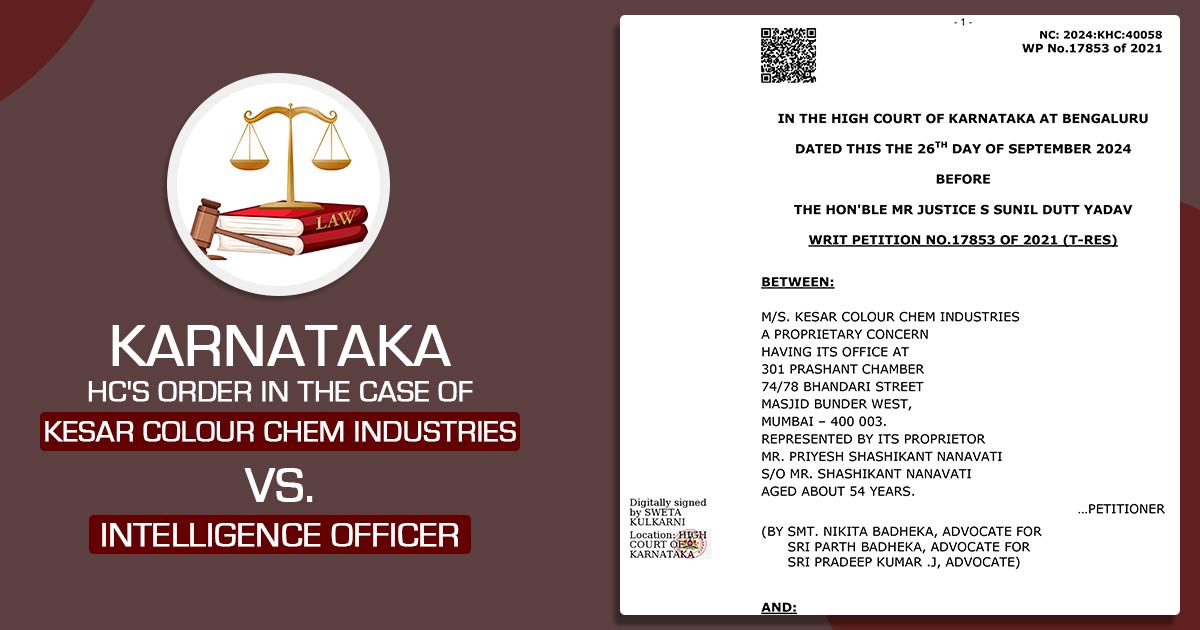
The Karnataka High Court, voluntary determination by the taxpayer himself as regards the tax liability, is sine qua non for ‘self-ascertainment of tax’ under the CGST Act.
The high court said that when the notice asked to be issued under section 74(1) it showed a new and complete adjudication and did not direct to a shortfall of actual tax needed to get filed as mentioned under section 74(7), the State itself is estopped from arguing that there was self-ascertainment by the taxpayer.
Single Bench of Justice Sunil Dutt Yadav observed that “if the Authority was of the view that petitioner had made payments as a part of the process of self-ascertainment u/s 74(5) of the CGST Act, the proceedings would terminate”. (Para 25)
Read Also: Karnataka HC Orders Verification of GST Documents Not Submitted Due to Noticee’s Hospitalization
As per bench “If the Authorities were of the view that the self-ascertainment and the amount paid u/s 74(5) would fall short of the amount actually payable, the Authority could in terms of Section 74(7) proceed to issue a notice as provided for u/s 74(1) in respect of such amount which falls short of the amount actually payable.”
Case Fact
At the time of the search operations of the firm Raj Chemicals, the statements of one of its partners Vijay Kumar Gupta recorded under section 70 of the CGST Act, where he directed supplies incurred via the firm to entities along with applicant/taxpayer pertinent to the invoices raised without actual supply of goods.
The respondent/department on verifying the e-way bills and the Fastag data discovered that the vehicles had not moved. The same would have consequences in investigation and even before the issuance of the show cause notice forcible recovery was incurred and it was asked to get passed off since the voluntary payments under the said process.
Hence the applicant asked for the refund of the amounts filed under duress and argued that self-ascertainment of the tax was not specified and the recovery incurred via investigation was in breach of the lawful mandate of Article 265 of the Constitution.
The applicant approached the High Court contesting the legality of the investigation performed under section 67 of the CGST Act and asked for a declaration that the recoveries to Rs.2.50 crores were ‘extracted coercively’ in Form GST PMT–06 Payment Challan. The applicant argued that recovery at the respondent’s office due to an investigation answering to the summons under section 70 of the CGST Act, was a misuse of power.
High Court Observations
The Bench remarked that the taxpayer has a chance even before the service of notice under section 74(1) established on ‘his ascertainment of these tax or the tax as ascertained by the proper officer’, to make payment and communicate the proper officer in writing concerning these payment as forecast under section 74(5).
The Bench directed to section 74(8) of the CGST Act, to note that once the individual is leviable with tax files tax, interest, and penalty then all the proceedings concerning the cited notice will be regarded to be concluded.
The Bench indicated that the payments of one crore and an additional one and a half crore made by the petitioner, along with the ‘DRC-03 declaration,’ do not constitute a self-ascertained tax.
The court additionally noted the summary of the show cause notice, establishing that the State itself has not acknowledged the self-ascertainment.
The Bench indicated that the recovery conducted while the case is under assessment may be interpreted as ‘recovery’ violating Article 265 of the Indian Constitution.
Therefore the Karnataka High Court asked the department to refund the amount of Rs 2.50 crores including interest which is alleged to have been recovered via the department in the grab of ‘self-ascertainment’ and partly permitted the petition of the taxpayer.
| Case Title | Kesar Colour Chem Industries vs. Intelligence Officer |
| Citation | NO.17853 OF 2021 (T-RES) |
| Date | 26.09.2024 |
| Counsel For Petitioner | Smt. Nikita Badheka, Sri Parth Badheka, and Sri Pradeep Kumar .J |
| Counsel for Respondent | Sri Jeevan J. Neeralgi |
| Karnataka High Court | Read Order |









